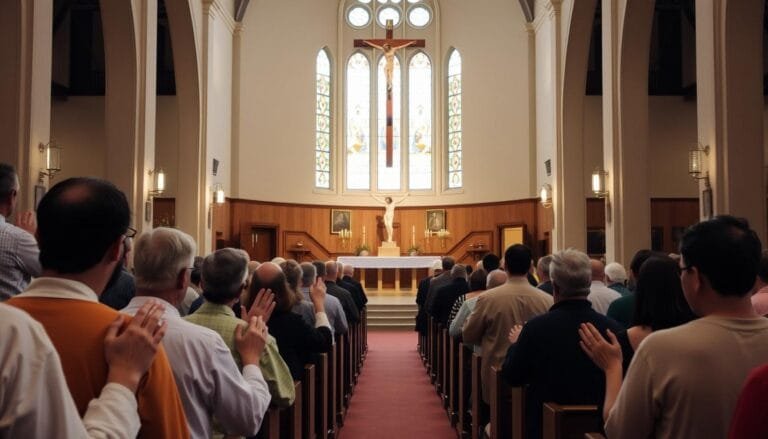Questions About Bible Study
This website contains affiliate links. As an Amazon Associate, I earn from qualifying purchases. The content on this website was created with the help of AI.
Key Takeaways
Understanding the Importance of Catholic Bible Study
The Role of Scripture in Catholic Faith
Biblical Literacy in Modern Catholic Life
Church Teaching on Scripture Study
“Ignorance of the Scriptures is ignorance of Christ.” – St. Jerome
Questions About Bible Study: Getting Started
Here are tips to build a consistent study habit:
- Set a specific time each day for your Bible study
- Start small – even 15 minutes daily can make a big difference
- Use a Bible study workbook to guide your reflections
- Join a study group for accountability and shared insights
The goal is to reflect deeply on God’s word, not rush through it. Take your time and pray for guidance. Ask your parish priest or catechist if you have questions.
| Resource Type | Examples | Benefits |
|---|---|---|
| Study Bible | Catholic Study Bible, Ignatius Catholic Study Bible | Provides context, explanations, and reflections |
| Workbooks | Little Rock Scripture Study, Ascension Press Bible Studies | Offers structured learning and reflection questions |
| Online Resources | Catholic.com, USCCB.org | Provides easy access to Church teachings and commentaries |
You’re now ready to start your Bible study journey with these resources and tips. Remember, it’s about growing closer to God through His word, not perfection.
Choosing the Right Catholic Bible Translation
Picking a Catholic Bible version is key for meaningful study. Catholic Bibles differ from Protestant ones in book count. Let’s explore popular translations and study resources.
Differences Between Catholic and Protestant Bibles
Catholic Bibles have 73 books, while Protestant versions contain 66. The extra seven books in Catholic Bibles are called deuterocanonical books.
These include Tobit, Judith, 1 and 2 Maccabees, Wisdom, Sirach, and Baruch.
Popular Catholic Bible Translations
The Douay-Rheims and the New American Bible are two widely used Catholic versions. Douay-Rheims is known for its poetic language.
The New American Bible, approved by U.S. Catholic Bishops, offers a modern translation.
| Translation | Year | Language Style | Recommended For |
|---|---|---|---|
| Douay-Rheims | 1582-1610 | Traditional, formal | Those who prefer classic language |
| New American Bible | 1970 (revised 2011) | Modern, accessible | General readers, study groups |
Digital vs. Physical Bible Study Resources
Digital Bibles offer handy features like search and cross-references. Physical Bibles give a tactile experience with fewer distractions.
- Jeff Cavins
- Dr. Mary Healy
- Dr. Andrew Swafford
The best Catholic Bible version is one you’ll read often. Try different translations to find what clicks with you.
Creating an Effective Bible Study Routine
Building strong Bible study habits deepens your faith. A routine helps you engage with Scripture regularly. You’ll find it easier to connect with God’s Word consistently.
Setting Aside Sacred Time
Pick a regular time for Bible study. Early mornings or evenings often work best. Aim for 15-30 minutes daily.
Mark this time in your calendar. Treat it as a sacred meeting with God.
Creating Your Study Space
Choose a quiet spot for your Bible study. It could be a cozy corner or outdoor area. Keep your Bible and writing materials close by.

Reduce distractions by silencing your phone. Use the “Do Not Disturb” setting if needed.
Incorporating Prayer into Bible Study
Start and finish your study with prayer. This links Scripture to your daily life. Try the Lectio Divina method for deeper understanding.
Read a passage slowly. Think about its meaning. Pray about its message. Consider how to apply it.
“Prayer and Scripture go hand in hand. As you read God’s Word, let it inspire your prayers. As you pray, let it guide you to the Scriptures.”
Consistency is crucial for effective Bible study. Begin with small steps. Be patient with yourself. Gradually increase your study time as you grow more comfortable.
Catholic Bible Study Methods and Approaches
Catholic Bible study offers rich methods to deepen your faith. These approaches help you connect with Scripture on multiple levels. Explore these key techniques for your study.
Lectio Divina is a time-honored practice for Scripture study. It involves reading, meditating, praying, and contemplating God’s Word.
This method fosters a personal dialogue with God through His message.
Start by reading a passage slowly. Then reflect on its meaning. Next, respond in prayer and rest in God’s presence. Lectio Divina helps you hear God’s voice in Scripture.
The historical-critical method examines the Bible’s historical context. It looks at the time, culture, and circumstances of the text. This approach helps you grasp the author’s original intent.
Thematic study focuses on specific topics across Scripture. You might explore love, forgiveness, or justice throughout the Bible. This method reveals how ideas develop across different books.
| Method | Focus | Benefit |
|---|---|---|
| Lectio Divina | Personal encounter | Deepens spiritual connection |
| Historical-critical | Context and background | Enhances understanding |
| Thematic study | Topics across Scripture | Reveals biblical patterns |
Each method offers unique insights into God’s Word. Try different approaches to enrich your Bible study. The goal is transformation through God’s message, not just knowledge.
Understanding Biblical Context and Interpretation
Grasping Scripture requires more than reading words. To understand biblical texts, you need context and proper interpretation techniques.
This process, called exegesis, is vital for meaningful Bible study.
Historical Context in Scripture
Each Bible book has a specific historical setting. This shapes its message. Consider the time period, cultural norms, and political climate when studying Scripture.
This background helps you understand events and their perception by the original audience. It provides crucial insights into the text’s meaning.
Literary Genres in the Bible
The Bible contains various literary styles. These include narratives, poetry, prophecy, and letters. Each requires a unique interpretation approach.
Recognizing these genres is key for proper biblical hermeneutics. For instance, you’d interpret a psalm differently than a historical account in Chronicles.
Catholic Principles of Biblical Interpretation
Catholic biblical interpretation follows specific guidelines. These ensure a faithful understanding of God’s Word. The Church stresses reading Scripture within the living Tradition.
This approach balances the literal and spiritual senses of the text. It always considers Scripture’s unity and its role in salvation history.
Applying these exegesis principles deepens your appreciation of the Bible’s message. It helps you see its relevance to your life today.
Connecting Scripture with Catholic Tradition
Catholic Bible study links God’s Word with our rich traditions. This connection deepens our faith and understanding. It goes beyond simply reading Scripture.

The Role of Church Fathers
Church Fathers shaped our understanding of Scripture. Their writings, called Patristics, offer insights into biblical interpretation.
These early leaders set the foundation for reading and applying Scripture today.
Magisterial Teachings and Bible Study
The Church’s Magisterium guides our Bible study. It ensures we interpret Scripture in line with Catholic teaching. The Catechism helps us understand biblical passages within our faith context.
Liturgical Connections to Scripture
Liturgical readings connect us to Scripture daily. Mass readings follow a cycle covering much of the Bible. This system helps us encounter God’s Word regularly.
“The Church has always venerated the divine Scriptures just as she venerates the body of the Lord.” – Catechism of the Catholic Church
Connecting Scripture with tradition gives us a fuller understanding of our faith. We see how the Bible, Church teachings, and worship practices work together.
This approach enriches our spiritual lives and deepens our relationship with God.
Conclusion
Catholic Bible study offers many benefits for spiritual growth. It deepens your understanding of God’s word and strengthens your connection to Church teachings.
Regular study can transform your faith, bringing new insights into daily life.
There are various approaches to Catholic Bible study. Find a method that suits you, whether traditional or digital. Create a dedicated study space and incorporate prayer into your routine.
Let Scripture guide you on your Catholic faith journey. The benefits of Bible study go beyond gaining knowledge. They include personal growth and stronger community connections. Start today and watch your spiritual life flourish through God’s word.












